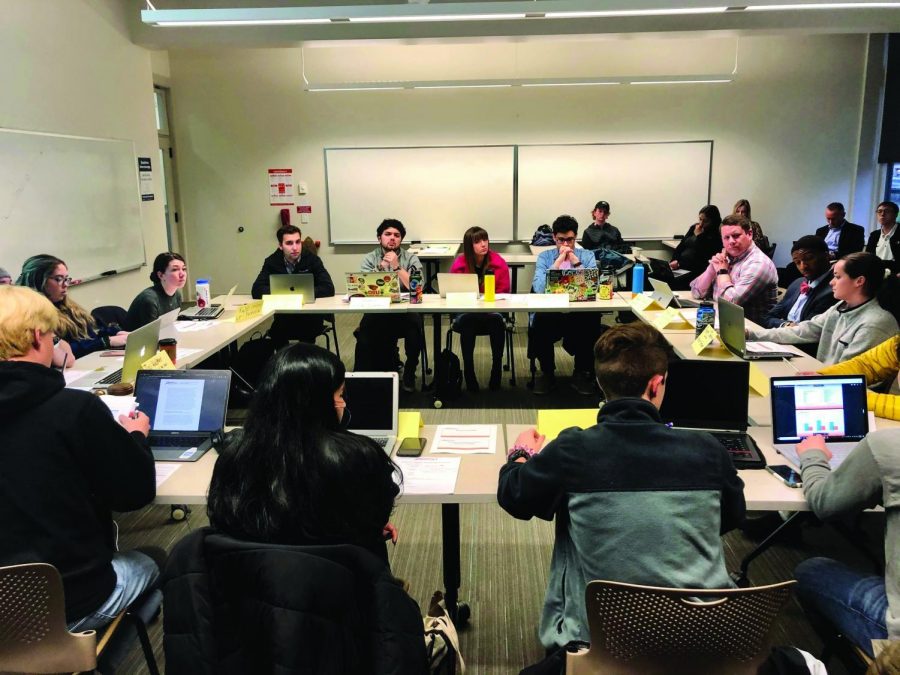ASOSU decides to pay future congress, retain SafeRide GTA
February 3, 2020
Congress and Student Fee Committee members of the Associated Students of Oregon State University, the university’s student government, decided to recommend granting funding to both SafeRide and the payment of future ASOSU Senators and Representatives in a Jan. 29 mediation meeting.
A 6:4 vote amended the original fee package in order to include both of these entities. Initial recommendations from the Student Fee Committee were to fund a package guaranteeing pay for future members of the ASOSU Congress, coming at the cost of not funding a Graduate Teaching Assistant for SafeRide. This proposition was shut down in the Jan. 15 ASOSU joint session vote.
The original fee recommendation was set to be $24.57 per student for the fall, winter and spring terms, an increase of 6.18% over the last year. Many ASOSU members felt that both parts of the package were too important to separate from.
“If we’re going to be prioritizing what we need to address, we can’t put student safety on the chopping block. The notion that it’s either that or not paying our students is a false choice, and realizing these important needs aren’t giving them anything they want,” said former ASOSU Senator and third-year student Dylan Perfect. “It comes down to the question of what are the fundamental values we’re trying to preserve here.”
Currently, only executive positions within ASOSU receive compensation, with student senators and representatives working on a volunteer basis. Congress members see this package as an important step to increase diversity and equity in the ASOSU program.
“This is an opportunity to show the student body what we believe in equity and safety. Having this package go through would increase the number of students that could be able to participate in these kinds of conversations…a few people have told me they wouldn’t be doing this if they wouldn’t be paid,” said Trenton Joiner, director of the Oregon State diversity initiative and chair of the ASOSU Student Advisory Board. “The passage of this bill is something that’ll cause a cultural change in ASOSU for years to come.”
This isn’t the first time that ASOSU has attempted to ensure payment for their constituents. Congress members were trying to make sure this was the last.
“From everybody I talked to that was a part of this process in the past, it was always ‘we’ll do this later.’ Somebody told me the earliest instance was 10 years ago, so it just had to get done,” said ASOSU Senator Brendan Lefranc. “It’s dangerous to push fighting for equity back, that’s what’s been done throughout history.”
The SFC was initially inclined to accept the funding of one package or the other, but not the conjunction of both. The inclusion of both packages resulted in an 8.81% increase in ASOSU-related fees, moving to a total of $25.18 per student for fall, winter and spring terms.
When the idea of delaying student payment was approached, Joiner said, “You can’t just assume you have time, we don’t have the time we think we have. This is the opportunity to change everything, or at least start that. You have just now, that’s it.”
The SafeRide package was created in order to continue funding the salary of a Graduate Teaching Assistant for the program. With a staff of just over 70 members, the GTA provides additional support and structure to the program, acting as the primary supervisor to the nine undergraduate leaders on staff. The GTA also assists with interpersonal conflicts and performance concerns, addressing over 300 complaints in the past year.
Funding the GTA position was never in serious question, with Congress members readily acknowledging the importance of SafeRide’s involvement with the Oregon State community. The lack of including a GTA position was the primary reason ASOSU funding moved to mediation in the first place.
“The SafeRide experience is more than just a clock-in, clock-out job… when you’re working from 10 p.m. to 3 p.m. on a Halloweekend, you become a family,” said Drew Desilet, assistant director of Student Governance.
The ASOSU Congress also convened on Jan. 27 to mediate student fee funding for the Memorial Union. With little deliberation, initial recommendations made by the SFC were upheld by the committee, resulting in a total fee of $71.31 per student during fall, winter and spring term next year.










































































































